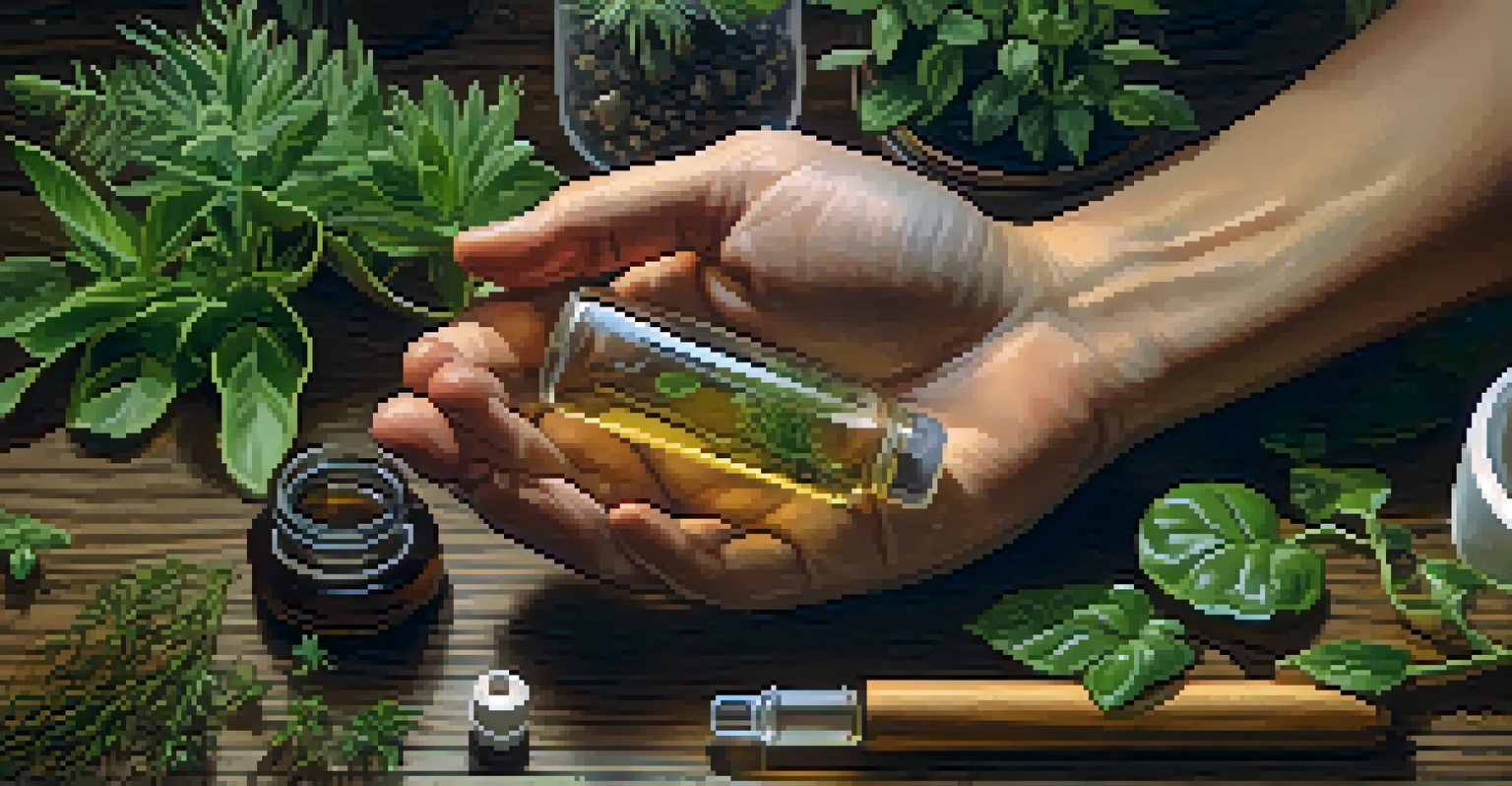The Potential for Abuse: Ethical Concerns with Entheogens

Understanding Entheogens: What Are They?
Entheogens are substances that are used in spiritual or religious contexts to enhance consciousness. Common examples include psilocybin mushrooms and ayahuasca, both known for their profound effects on perception and emotional understanding. The term itself derives from Greek, meaning 'generating the divine within.' As their popularity rises, so too does the need to explore their ethical implications.
The use of entheogens is a deeply sacred practice, rooted in the traditions of indigenous cultures, and should be approached with respect and understanding.
These substances have been used for centuries in various cultures, often for healing or spiritual insight. However, modern interest has surged, leading to a more widespread and sometimes reckless use. With the increase in accessibility, it’s crucial to consider who is using these substances and for what purpose, making ethical considerations paramount.
Understanding entheogens also means recognizing their potential risks. While many users report transformative experiences, there’s a darker side that can include addiction, psychological distress, and exploitation. As we explore their potential, we must also weigh the responsibility that comes with their use.
The Risk of Misuse and Exploitation
One of the primary ethical concerns surrounding entheogens is their potential for misuse. Without proper guidance and context, individuals may turn to these substances for escapism rather than healing or spiritual exploration. This shift can lead to dependency and a cycle of abuse that undermines the intended benefits of these powerful compounds.

Moreover, the commercialization of entheogens raises questions about exploitation. As more companies enter the market, there’s a risk that the sacred traditions surrounding these substances could be diluted or commodified. This commercialization can lead to a profit-driven approach that neglects the cultural significance and safe practices established over centuries.
Ethical Use of Entheogens Matters
The rising interest in entheogens necessitates careful consideration of their ethical implications and responsible use.
Additionally, vulnerable populations may be disproportionately affected by misuse. Those seeking healing from trauma or addiction may find themselves in situations where entheogens are marketed as quick fixes. This not only poses ethical dilemmas but also highlights the need for responsible education and access.
Cultural Appropriation and Entheogen Use
Cultural appropriation is another critical issue when discussing entheogens. Many of these substances have deep roots in indigenous cultures, where they are used with respect and specific rituals. When individuals from outside these cultures use them without understanding their significance, it can lead to a form of exploitation that disregards their history.
The commercialization of entheogens risks diluting their spiritual significance and commodifying sacred practices for profit.
This appropriation often sidelines the voices of indigenous people who have safeguarded these practices for generations. The commodification of their traditions can strip away the spiritual context and turn sacred practices into mere recreational activities. This raises ethical questions about respect, acknowledgment, and the preservation of cultural integrity.
Engaging with entheogens ethically necessitates honoring their origins. This involves listening to the perspectives of indigenous communities and understanding the importance of consent and representation. By doing so, we foster a more respectful and informed approach to their use.
Mental Health Implications of Entheogen Use
Entheogens have gained attention for their potential benefits in mental health treatment. Studies suggest they can aid in alleviating symptoms of depression, anxiety, and PTSD. However, the lack of regulation and oversight raises ethical questions about how these substances are administered and who is providing the care.
While many individuals report positive experiences, there are also risks associated with unsupervised use. Without proper guidance, users may encounter adverse psychological effects or exacerbate existing mental health issues. This highlights the need for trained professionals and established protocols to ensure safety.
Cultural Sensitivity is Crucial
Understanding the cultural significance of entheogens is essential to prevent exploitation and ensure respect for indigenous practices.
Furthermore, the therapeutic landscape is evolving, and the integration of entheogens into treatment requires careful consideration. Ethical practice must prioritize informed consent, the user’s mental health history, and ongoing support. Balancing innovation with responsibility is essential as we navigate this emerging field.
The Role of Education and Responsible Use
Education plays a crucial role in mitigating the risks associated with entheogen use. Providing accurate information about their effects, potential benefits, and risks can empower individuals to make informed choices. This is particularly important in an era where information is readily accessible but often lacks context or depth.
Responsible use also involves creating supportive environments where individuals can explore entheogens safely. This includes establishing guidelines for dosage, setting, and integration practices post-experience. By fostering a culture of responsibility, we can help ensure that entheogen use aligns with its intended purpose—spiritual growth and healing.
Moreover, communities can benefit from shared experiences and collective learning. By encouraging open dialogues about entheogen use, we promote understanding and respect, reducing the stigma often associated with these substances. This collaborative approach can lead to healthier practices and a more informed public.
Legal and Policy Considerations for Entheogens
The legal status of entheogens varies widely around the world, impacting their availability and use. In some areas, they are embraced for their therapeutic potential, while in others, they remain illegal and stigmatized. This patchwork of regulations raises ethical concerns about access and equity in treatment options.
Policy development surrounding entheogens must balance public safety with the need for research and therapeutic use. As more studies emerge highlighting their benefits, there’s potential for reform that acknowledges both the risks and rewards. Engaging with lawmakers, healthcare professionals, and the public is essential in shaping policies that reflect informed perspectives.
Education and Regulation Needed
Effective education and clear regulations are vital for promoting safe and informed use of entheogens in therapeutic contexts.
Ultimately, establishing clear regulations can protect individuals while promoting responsible use. Ethical policy should consider the needs of marginalized communities and ensure equitable access to entheogen-based therapies. By fostering a dialogue around these issues, we can work towards a more informed and compassionate approach.
Future Directions: Navigating Ethical Entheogen Use
As interest in entheogens grows, so does the necessity for ethical considerations. Navigating this landscape involves collaboration between researchers, healthcare professionals, and cultural custodians. By prioritizing ethical practices, we can ensure that the use of entheogens is respectful and beneficial.
Ongoing dialogue about the implications of entheogen use is crucial for fostering an informed community. This includes sharing experiences, discussing ethical concerns, and advocating for responsible use. Engaging in these conversations can help mitigate potential abuses while promoting the positive aspects of entheogen exploration.

In conclusion, the future of entheogen use hinges on our ability to balance potential benefits with ethical responsibilities. By approaching these substances with care and respect, we can unlock their potential while safeguarding against abuse and exploitation. Together, we can cultivate a rich understanding of entheogens that honors their history and embraces their promise.